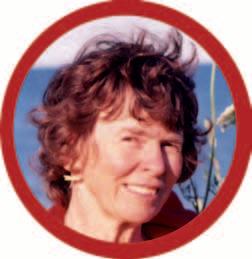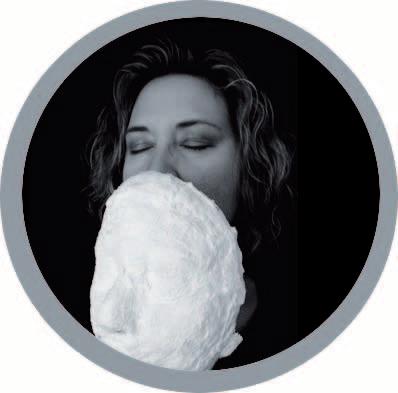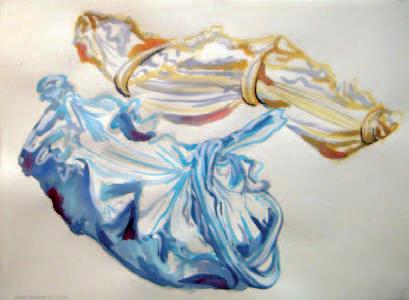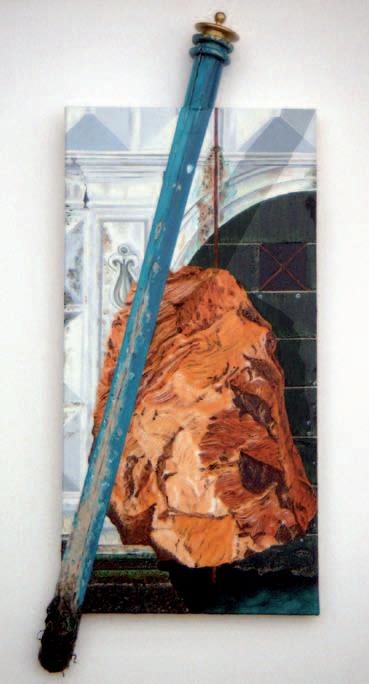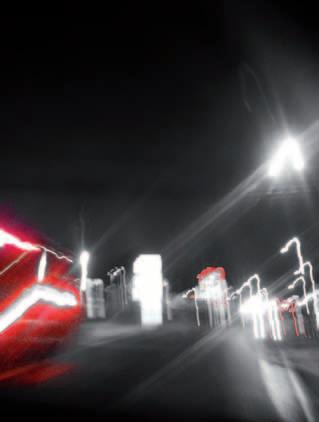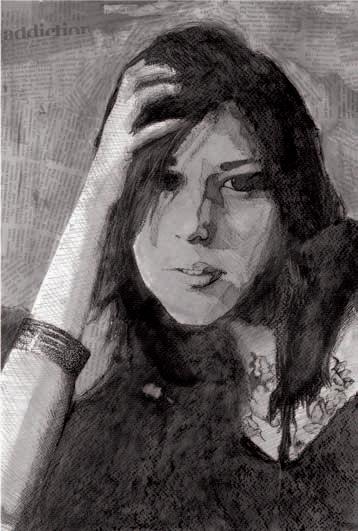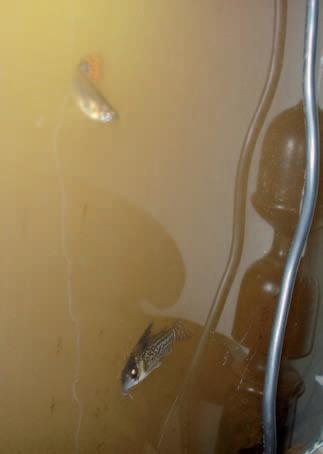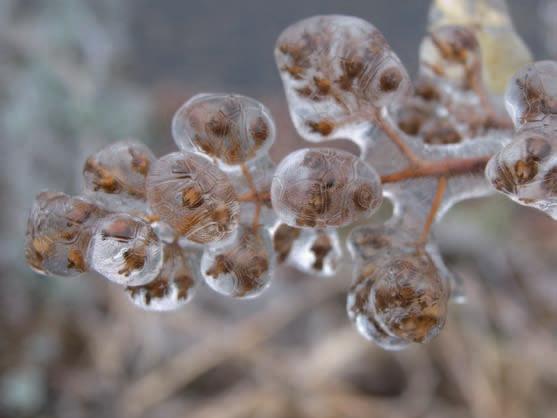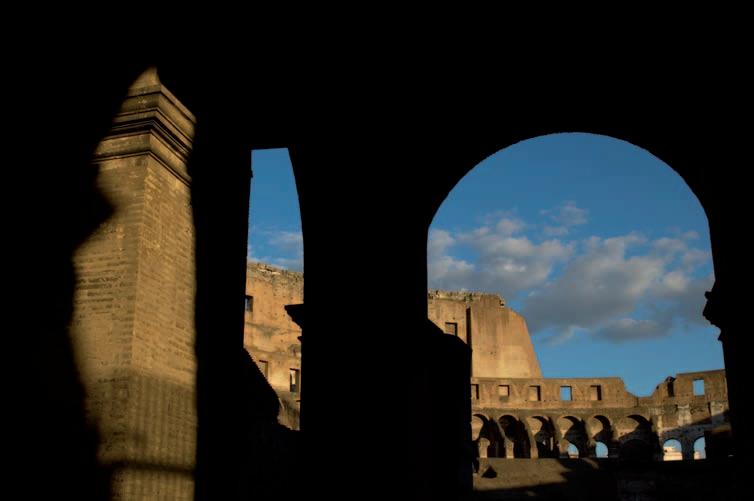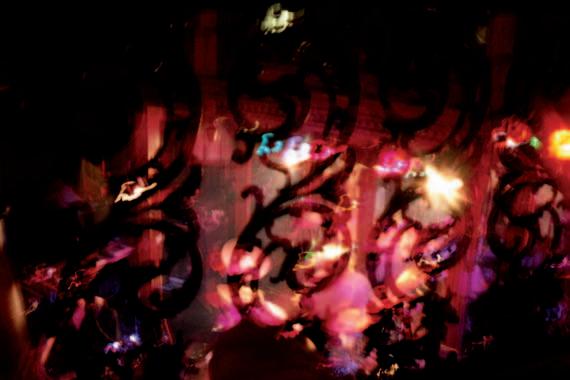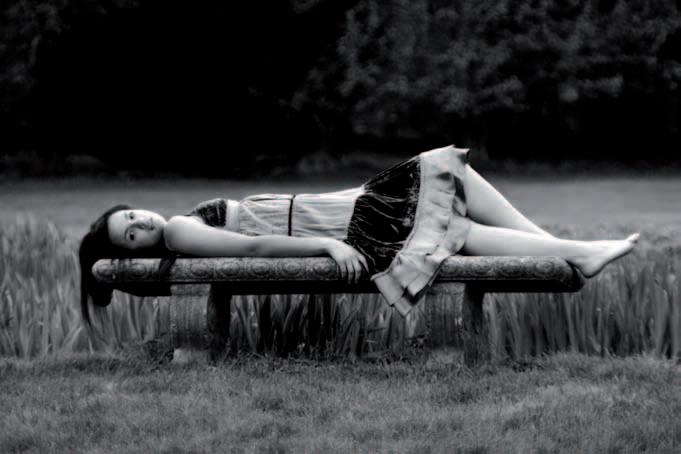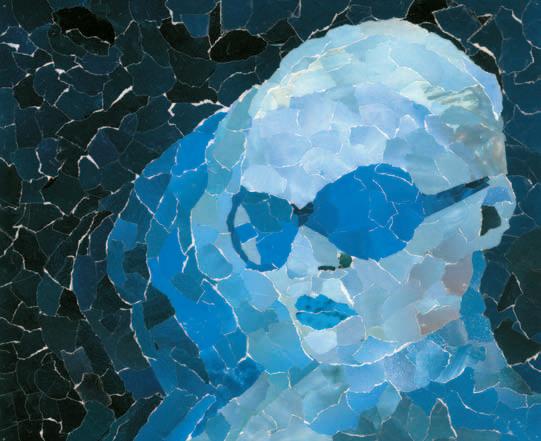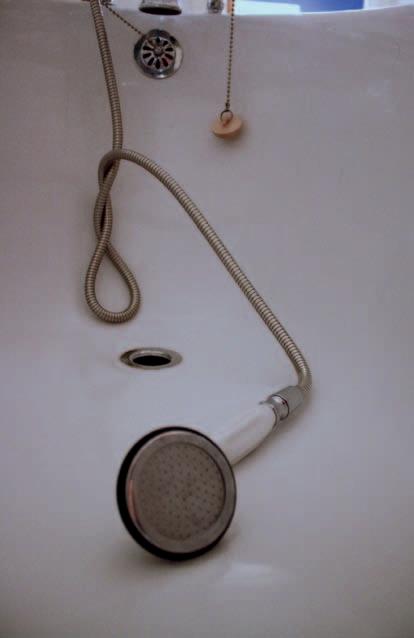Joy Gonsalves

Wash- Up
Mornings I wake to Grandmama’s pink house-shoes shuffling over the kitchen linoleum and the crackle of her daily bacon, her pillow half-sunk and smelling like pomade. She calls me for breakfast, but not coming right away because I want to savor this shelter of smell and sound, I lie where I am and watch her in my head. Mostly I love how she uses her hands, the way she holds knives without hesitation; in the small firmness of mine, her palms are soft bags of bone and water.
Once I’ve finished my plate and Granddaddy is on his way back to sleep, she’ll lay a towel on the floor, run the water, and take me to the sink— the one where Gran draws her eyebrows and Aunt T. leaves her teeth. Together we lean into the bowl, her cotton robe against my bare back; Grandmama washes me up.
I fix my eyes on the iron hands of the wall clock, drop my shoulders when the rag and the water unwind. The water unwinds, and her dark hands white with soap, take both my arms and slide down them like sleeves in one long stroke--hands with their ropes of veins over knuckles, covering my knees and ribs and chin.
She holds me steady while she works, and I take in the smell of the Ivory, the clearings of her throat--these necessary preparations, among others, I am free to remember or forget.
11 12
11
12
She works her corner every night, and struts those long legs looking tight. She acts so coy until the morn, then terminates from feeling torn. The spinning threads of silk suspend, as flying prey now meet their end. Spreading her soft internal flower, she wraps them tight within her power.
Love is a wave, Comes and caresses gently, Kisses and hugs you, And easily as it comes, leaves. If not careful drags you deep. If not careful can drown you. What is love without a wave?


It’s a typical Monday morning. I awaken to the scent of already brewed coffee. My glasses are still upon my face, and my flashcards scattered upon the bed and floor. It had been another night of cramming for a test, and all I can think of is coffee and you. You, my elliptical shell of treasure, with your glutinous essence enclosed within. I head downstairs with my flashcards. I crack you open and watch you spread your essence, As you bubble into life, in a skillet of sizzling sweet butter. Daydreaming, I drink my coffee, with these three Great men, watching you fry into a fluffy white disk. Would Cyrus, Darius, and Alexander have loved you like I do? Would they have thought of you and needed you, off to fight for the Persian Empire?

15 16
Francisco Baez
Kevin Dempsey
Kevin Dempsey
Daley
In spring, the cold has started to subside, and the rain melts the ground.
An intermingling of scents will come, but for now a world of mud.

And the rain hits the roof. An untrained drummer at practice.
Then pretty little flowers sprout from the mud, and small birds romance our windows.
Chief among these birds is the frailest of the small: the rhythmic hummingbird.

Suspended in air as a still-frame complimenting the midday sun.
You, little bird, are just outside my window – hovering like the swan of bees.
And for you the flowers are the bounty the remuneration for the cold dead winter.
And I gaze at you as I cross my room’s cold tiles to pull on the string and be rid of you and your flowers.
James Daley
Wild naked homeless man proselytizing on the lawn
His arms soaring
Like a call and answer minister Can I get a hallelujah
Amen
Can I get a dollar Amen
My neighbors have gathered to see our guest
They probably think he’s one of my Dad’s old college friends
I’d ask him inside but, he might fight the dog
He’s going away now and I think I might join; Naked and wild and homeless preaching on my neighbor’s lawns.
But they’d recognize me. And call my Dad. Who would pick me up and make me walk the dog.
17 18
James
R. Tristan DeWitt
It took shape
Beneath a recently-named Star. Call it chloe.
chloe was a princess: moody, indecisive, hot and cold.
She trained herself
To favor and prefer—

Like daydreams of pretty fragrances

On the floor of the Stock exchange.
R. Tristan DeWitt

The shouting boy Rolled over his handle bars Like a rag doll. We looked on and Discussed among ourselves The possible merits of dying young And decided against aiming for it.
Everyone present was visibly Disturbed by the extinction Manifest in the boy as he lay motionless.
Concussed inside a whirling nightmare, He yearned to be back In the barns after school, To be hailing some chemical alternative As it shuffled the cards.
Today’s harm became a storybook end. Its lips tasted ours And we had to look away.

Thomas Shamma
I've got pipes inside my head. They see what happens, hear what's said, And when they sense discrepancy, They rattle. This rattling's called dissonance, And if you listen, you might sense It happening in your own head— But, careful.
'Cause dissonance will drive you mad, And, frankly, this may make you sad, But it's just fucking everywhere. You'll hear it. And once you do, no turning back. Though you'll most surely try. In fact, You'll find you cause a lot yourself. So, clear it.
Because, believe me, when you're near, The clever of us all can hear Your plumbing's not quite up to par. You rattle.
Thomas Shamma
I'm sorry it was all for men
When fathers wrote it down, But, my darling little girl, Please read it anyhow. Please take it with a grain of salt The pronouns that they use, I don't want you to "be a man," But you can pick and choose. I'm sorry for the world that came Before you came to be, But though, in one way, they were fools, That's not all they could be. They wrote these lessons for their sons, And sons through all of time, But just because they failed you then Does not mean they were blind. My darling, they discounted you When teaching how to live, They thought life was for men alone. But if you can't forgive, At very least, please get them back By using what they said, My daughter, you deserve to live The life their sons have lead.
19 20
Joseph Kariuki
As the rays of the sun shine, My heart smiles My soul laughs
My spirit cradles
I feel happiness
I see peace
I see victory
I see laughter But, I can hear The cries of the poor The tears of their souls
The pains of their spirits
The craving of their souls Searching for a space
To exploit their potential
John Hoyt
(robotic voice speaks)
Cell phones are the callous of society’s thumb. Life imitates art, art imitates life. Hue-mans imitate technology, technology controls hue-mans.
I have a text msg.


I know where you are, you know where I am. The phone is watching. I stop my life when my phone rings. I stop my life when I get a text msg. LOL
I stop my life when my computer tells me, “You’ve got mail!”
When can I start to live my life?
I don’t know how to speak anymore. Do my vocal cords even still work ?
The callous on society is getting bigger.
if only could smell rain the tunes of the drops the smashing of the air only if could see the dreams that i could say that you are my own the beauty of life.
it’s good to own and know yourself than to live a life chasing the image of your own shadow. i see life the way i watch the flowers bloom. sometimes they are cool, bright and happy. as time passes, the sun shines, the wind blows the flowers smiles ‘til they fade. and on a brighter day they bloom again. so if only i could have a chance i would bloom again.
The machine gives me money. The machine takes my money. The machine makes money.

Is it watching ? Am in control ?
Or am I just a puppet of flesh?
Where is my life? Someone please pull the plug ?
21 22
Kevin Dempsey
The leaves are falling, Laying lifeless on earth. Majestic pigments Of magenta and mauve, Weathered trees Bare and broken, Frosty firs flourish In black forest, Nuts are scattered Upon the wintry ground
As squirrels scurry, Gathering stock for the survival.
Mountain summits Sparkle with snow
And the river is running Rapid, rugged, and cold.
The moose are watching And wandering the forest, Like Turkish nomads Through Tibetan plateaus
As the coyotes howl, Huddle, and hover.
The forest is awake, But dark and deep.
Madelyn Kidder
It’s not fair, to not have a mother. Everyone else has one.
Why were you the way you were?
Quiet, distant, crazy, disturbed.
What went on in that mind of yours - when did the paranoia set in?
Did you really think the Indians were coming, the atomic bomb was dropping, Or that Dad was beating you?
I didn’t know who you were talking to.

The catatonia, hospitals, shock-treatments – it all frightened me so.
When were you going to get better ?
When I got older, behaved, when they gave you your mind back ?
How I wish I had known you for just one day... normal, fun, and laughing with me.
I never knew you, only what I did not want to know.
A little girl wanted so much for some normalcy, not embarrassment.
I didn’t know that you were suffering inside.
How can I miss someone that I have never met ?
I always believed that one day you would get better, That you would become whole; come alive!
But that day never came; you withered away and tears flowed down my face.
23 24
Guest faculty artist







ficti on
Joshua Cirinna
What you need to know about Audrey is this: don’t eat any salad she prepares for you. Don’t hire her to work with food, or send her to a soup kitchen for her community service. Just make her restock library books, or pick up trash. If you take her out, don’t bother springing for the lobster; it’ll just be money down the drain. Like any woman, there is more to her than her warning labels, but there you go. Those are the things you need to know. If were you, I’d also avoid asking her about her past.
Audrey was as slim the last time I saw her as she was when we met. I’ve met her mother, and knew this was no small feat. Beating genetics is a willful and stubborn affair. When people talk of men becoming their fathers, they are speaking of character usually: the boy becoming the man, the man becoming the legend his father was. When people say a woman is becoming her mother, they mean she is getting fat. Audrey wouldn’t let herself be that, as if she could escape her mother’s character by escaping her mother’s figure. We dated briefly in college, and later became close friends and officemates with her husband. Chase was as outgoing and charming as her, and while her overgifting and hostings had the edge of mania about them, his friendliness always seemed comfortable. I knew about both of their food issues; Chase and I had talked at length about his bulimia, sometimes with pride over the control he thought he had over his stomach, sometimes shame at his powerlessness over his impulses. He told me in an email once that he could have made a killing in gay porn. At that point in his disease, he was having a harder and harder time making himself gag.
Audrey had always been just as bad, even before we met. I knew she was as twisted as Chase when it came to food; I knew she abused laxatives, had trouble gagging. For her, her issues with food started in her head, and went right down to the gutter. I knew from dating her not to let her sign up for salad at any potluck dinner. I sure wouldn’t eat anything she made that had carrots or cucumbers in it. I found that out the first time we made a dish for dinner at her parents. If it was food, and phallic, and was going to be fed to friends or family, chances are it had been up her ass or her pussy, her climax wiped off with a paper towel before being sliced into her dish. She served her sex to her parents that night with a smile, her eyes laughing across the table at them with their every incestuous bite.
When she met Chase and starting bringing him around, I knew they were meant for each other. We went to dinner with them, my wife and I, and both of them had that look I used to see in her when I would take her out. Their eyes
darted all over the restaurant. They stared at everyone’s food like starving dogs.
Audrey bonded with her husband over food; they saw in each other their secret lives. Their first real date had been cautious and guarded until they both went to the bathroom before dessert. Coming out at the same time, they knew the look of secret shame and secret triumph they saw in each other’s faces. Their puffy, bloodshot eyes betrayed their purge. They were inseparable then, leaving campus at all hours to visit out of town buffets. They descended on them like locusts, puking in the bathroom and getting plate after plate until they were banned from every buffet in a thirty mile radius.
A Buddhist would say that desire and attachment to the material world is the root of all suffering and should be purged. Audrey and Chase would say attachment to their dinner was most people’s problem.
can’t tell you how many times I came back to the office to find Chase rummaging through our trash for a bite of sandwich or bagel I had thrown away. I’ve been at lunch with him when someone next to us leaves with food still on their plate. He would look at it like it caused him real pain, fidgeting and rocking back and forth until it was cleared by the wait staff. Then he would say, “What a waste, what a
waste,” and shake his head sadly. On one occasion, a patron left the better part of a steak on their plate, and Chase squirmed in his seat for a half a minute before throwing his portion of the bill on our table and bolting into the bathroom with the stranger’s steak to wolf it down over the sink before running out the back through the alarmed emergency exit. We drifted a little after that, and I never ate alone with him again if I could help it.
The natural escalation, and you could ask either of them, was this:
• As a child, holding your breath for attention, then, strangling yourself until you passed out, for fun.
• As a teenager, cutting yourself for attention and emotional release.

• Finally, with maturity and an understanding of society’s values, bulimia. You can have your cake, and shed it too.

It was the perfect cheat. Everyone could be jealous of your metabolism while you laughed at their diets, their haranguing over sugar and white flour. When Thanksgiving dinner made everyone sleepy and fat, all Audrey and Chase got were raw, puffy eyes with red spots in the whites.
After you’ve made yourself throw up, Chase told me, the best part was standing in front of the mirror and looking at yourself. Snot runs down your face, and your eyes get red and watery. At that moment, when you can’t breathe through your nose and the edges of your vision are fuzzy, you look more human than you ever have in your life. Your face has something so close to real emotion on it that it could fool anybody. You can even fool yourself.
53 54
It was the money that caused all of their problems. The easier it is to satisfy Maslow’s lower needs, the harder it becomes to ignore the deficiencies in your satisfaction of higher needs. The best part about being poor is not having the energy to worry about esteem or self-actualization. It’s just “feed that hunger” and “grab those resources.” Not that either of them would have gone back and ripped up that ticket if given the chance. They were mentally ill, sure, but they weren’t crazy.
When they won the lottery, and every bill was caught up with, and all the things they wanted were within their reach, they went a little nuts. They became insecure with each other. Before the money, it had been them against the world, hoodwinking their neighbors and friends, sharing their secret life, their finances. They were codependent completely, emotionally and financially. With all that money, they both got scared. They both became terrified of the other’s independence and that they would be left all alone.
I didn’t know it at the time, but that was when they stared sabotaging each other. They tried to keep each other the only way they knew how. They started screwing with each other’s food.
It’s fair to say that Chase would probably still be alive if he hadn’t tried to treat his bulimia. That was what caused her escalation. He took to carrying paint thinner in a squeeze bottle, spraying it on food thrown in garbage cans when he felt the compulsion to eat it. My wife made me kick him out of our yard finally, when he squirted turpentine in her potato salad. I remember his face when he drove off, the last time I would see it. His triumph at fooling the world was gone. All that was left was the shame, and for the first time since I’d known him, fear. Even as he was getting better, he was getting worse.
Audrey and Chase still had their secrets, but now they were secrets from each other. She was terrified he would get healthy and leave her. He was terrified she would stay skinny and leave him. I’m glad I already didn’t trust their food, because now it was their arsenal, the ammunition in their secret war. He replaced all her laxatives with chocolates or multivitamins, and she secretly sabotaged all his diet food. She injected corn syrup into his low fat yogurt containers through the foil tops; she basted his crackers with clarified butter. She replaced his egg beaters with eggs and egg yolks. He replaced her Metamucil with weight gain powder.
At the trial she cried on the stand. The camera loves that. Her face, her puffy red eyes, her running nose; it was the same face she had after making herself throw up. Her real emotions displayed a believable simulacrum of the emotions her face pretended after vomiting. She had thought about it then, that strange loop, the real mimicking, the pretend, and she laughed. The jury saw it as hysteria. That was fine. The camera loves that too. She was rich. She was slim. In America that was the same as being famous. In America, that lost you all sympathy. The rich and the famous; no one is more reviled and resented. The trial coverage went national before it even started. Everyone loves to see the successful fail, the mighty fall. Everyone wants the shiny apple they can’t reach to be rotten inside. In Germany, they call it schadenfreude, joy at another’s misfortune. In America, it’s called tabloid journalism.
In a women’s prison, there is no food that can be used to pleasure yourself; no whole carrots, no celery stalks, nothing phallic at all. Sausages, hot dogs, bananas; these are all cut and castrated into bite sized pieces. Audrey was not the first woman in prison with a proclivity for foodplay. For lack of a man, a woman might risk toxic shock syndrome from a dry and hardening kielbasa or foot-long.
On the night Chase died, Audrey was the only one on scene, the one who called 911. Her distress was convincing. It wasn’t until the toxicology report came back that she became a suspect. There was so much Coumadin and Dicumarol in his system that his blood was thin as water. The blow to the head that he should have been able to shake off caused him to bleed out into his skull instead. She was arrested at the funeral after knocking over the casket in a grief stricken rage. She had to be pulled off his made up body, pounding on his chest and sobbing.
“You selfish son of a bitch! Why couldn’t you have just gotten fat ?” They held her for desecration until they got enough to charge her with murder.
More came up at the trial than I even knew about. The search of their house turned up pounds of hidden candy and desserts. The police finally just started following the ants to find some of the more ingenious hiding spots. That was the part that surprised me more than anything, not the food, but the “his and her” stashes. That never would have happened before they were rich. When they were poor, when they were on the same team against the world and the bill collectors, they always gorged from the same pile.
Chase didn’t have toolboxes full of Twinkies. He didn’t have bags of chips and licorice stuffed in the wheel wells of his ride-on lawnmower, and under the hood, and under the seat cushions. Audrey didn’t have hat boxes in the attic full of melted Lindt chocolates.
And of course the empty pill bottles and blood thinners stolen from her aging mother. Her motivation for grinding them into all his stuff was guided by love, even if her logic was misinformed.
“With all that high cholesterol food I’m sneaking him, he may very well have a heart attack, or a blood clot and die,” was her thinking. Her mother was at risk for heart attack and stroke. Her mother was on blood thinners. Conditional logic told Audrey that this meant blood thinners kept people from having heart attacks.
The prosecution started to lose steam. Yes, she was putting bacon grease in everything she cooked for him. Yes, she replaced all his low-fat Oreos with double stuffs and put heavy cream in his skim milk. But she had done it to keep him close to her. She was trying to cripple him for a new lover, to get him too fat to find someone new.
They tried their hardest to paint her as Kathy Bates from Misery : obsessive, clingy, and dangerously possessive. Expert witnesses spoke of disorders. Insecure or reactive attachment disorder. Early childhood abandonment disorder.
The jury didn’t buy it. Everybody is trying to hold onto something they fear losing. Everyone has lovers that leave, children who move way, television shows that are canceled, pets that die. If any of them thought they could keep what they had by ruining it for everyone else, they would. You could almost see the nation taking notes. How to keep a husband. How to get your children to fail and move back home. All it needed was a “For Dummies” after it and it would have sold a million copies.
Audrey, when asked to make desserts for bake sales, would invariably burn whatever she made so it wouldn’t sell. So it would return to her. Chase was forever coming to the office with his jacket pockets stuffed with charred brownies and lemon squares
55 56
They say that men kill their women to keep them from leaving, whereas women kill men to get away from them. The role reversal in Audrey’s case confused the jury, so they rejected the prosecutor’s argument. It was a happy accident that she really was innocent.
The defense was accurate in its painting of events. Chase had felt lightheaded. He hadn’t been eating most of the food she prepared him. He had become suspicious of her meals after finding butter wrappers buried in the trash when he was looking for scraps. He was flushing a lot of the food down the toilet; bulimia without the consumption, waste without pleasure. He was dizzy from blood thinners and not eating enough. He took a spill at the top of the front staircase and hit his head on the banister on the way down. Then he went to bed instead of getting his head checked out. Why would he? He didn’t know he was bleeding. His watered down blood flooded his brain while he slept; Audrey woke up when he didn’t get up to sneak to the garage for his midnight snack. Her grief when the police arrived was more than believable; it was true.
Audrey was acquitted. The prosecution was enraged. They pursued her further, considering her grief and public humiliation insufficient penance. She was sentenced to five years for elder abuse for stealing the blood thinners from her mother. There was no public outrage at the harsh sentence. Everyone had moved on, everyone was done with the spectacle. They had seen all of Audrey’s secrets, all her dirty laundry, and she had nothing left for them to take. And Audrey was tired. She pleaded no contest, and just quietly withdrew into herself.
She was slim and beautiful when I saw her last, staring blankly over my shoulder from behind the visitor glass in her prison jumpsuit. Slim and pretty, but not radiant. She was a woman haunted, just a ghost really. That last look I saw from her was just like my last look from Chase, her playful triumph defeated and vacant. When I got up to leave though, I saw a little hint of something else. I hadn’t known what to say when stood, so I said, “You look good, Audrey,” and she gave me a quick smile and winked. On her one open eye, a small burst blood vessel.
Beezus got Straight A’s. Then Beezus got C’s. Then Beezus was back in the middle of the semester, pale and slimmed down, with her bags and a pocketbook she wouldn’t let go of. A clutch. When we picked her up at the train, Mom told her she looked like a concentration camp survivor. “You look like a goddamn Nazi camp Jew. Unbelievable.”
Unbelievable, said like she expected nothing less. Unbelievable, said as if she just won a bet against a bitter rival. Her face, a fighter’s, disappointed by his opponent’s ease of defeat.
“Wow,” I say. “Heroin chic,” and Beezus eyes me suspiciously.
“You look good,” I say, and we both look out opposite windows.
Mom is talking to the road, mumbling. “Unbelievable.”
Then she is loud again. “Do you have any idea how much money that school was!? suppose you’re going to just write your poor grandfather and tell him, ‘Thank you for the forty thousand dollars, but I decided I would rather spend my days shooting drugs’?”
Dinner hasn’t been so great since Beezus came home. Mom just stares over the rim of her wine glass at Beezus, and lets her food get cold. Dad buries himself in his train catalogues and eats everything on the plate without looking. I eat with false gusto, smiling and making nervous compliments to the chef, wonderful weather today, did you bread this pork differently this time? Beezus just stares at her fork and plays with her food, eating her emotions with gulps until they come up and the screaming starts.
It’s the argument they’ve been having since Beezus turned thirteen; the drugs are just the newest coat of paint

on the same sorry old fight. Dad leaves. follow him, but break left and run upstairs to my room. Someone downstairs starts whipping glasses, and I sit down between my bed and my closet and put on headphones.
I dream our family is cavemen sometimes. I see my mother, standing over Beezus with a boulder over her head, hooting and shrieking in triumph while my father sits by the side of the fire, picking fleas out of his beard and waiting to see which female will establish herself as the alpha bitch. Beezus scrambles around the cave to find her own space, but she is never given respite from our murderous mother.
If Beezus fucks up just once more in the house, she will be out on her ass. She is over eighteen, she can live under a goddamn bridge for all we care, is the official family position.
Mom and Dad stay out after work more and more. Mom isn’t very social, so suspect she is just sitting behind her desk at work, watching cute animal videos online and drinking in the dark. Dad keeps passive-aggressively leaving those fucking hobby train catalogues everywhere, his reminder to us that he would rather have had a room for trains than either of us. He has never bought a single thing from any of the catalogues, or from the hobby shops he haunts, just to give his grudge more teeth. I am left alone with my sister. I don’t want to go out, in case she dies. I don’t want to deal with our parents all by myself. Beatrice is a full time job for them, and my days go pretty much unmolested by their meddling.
I go upstairs and look in Beezus’ room. She is in there, kneeling between her bed and her closet. It’s dark except for her desk lamp and I see nothing at first. Then I see Beezus, leaning her head against the slats of the closet door. Above her scrawny bicep she has on one of Dad’s ties. Trains on it, of all things. It’s twisted and tight on her arm, her arm red like a finger with a string around it.
58 57
Josh Cirinna
I remember that tie. Mom started accusing me of stealing it after Christmas. After Beez’s last visit. I remember how pale she looked even then.
She has her eyes closed and there is a smile on her face. I’ve never seen someone smile a smile that looked so sad. It’s the smile of someone remembering a lost love. One eye opens when her bedroom door raps against her desk from me opening it. She starts, jerking her head away from the closet. Her hair is caught in one of the slats, and her head snaps, chin jutting out.
“SSSsssssssss. Ow… Oww!” she says, sitting up with her hand on the back of her head, the other picking at the slats.“What the fuck, Henry!”
“What!? What the fuck YOU!” I say.
Beezus pauses a second; she says, “Chicken goo.”
My mind is reeling; the whole scene. I’m dizzy and my voice sounds distant, my blood loud. I’m going to lose my idiot sister.
“….what ?”
“Chicken butt!” she says, laughing now, and the room comes back in focus for me.
“Oh for fuck’s sake, Beez, it’s like you don’t even care,” say.
She pulls off the tie with a whipcrack and lies down on her back, breathing out slowly. When she speaks again, it sounds like someone is standing on her chest.
“I’m sorry, Henry. I didn’t mean to come back. I know you wanted my room.”
That is not fair of her. “That’s not even fair; I’m not that self centered,” say. “Besides, I’m pretty sure Dad was planning to just fill it with trains.”
Laughter comes rattling up from behind the bed, from my sister, my stoned, wasting away sister. Daddy’s little junkie.
“Oh, that’s right!” she says. “Oh man, this must really piss him off. that’ll....”
That’ll show him, guess was the end of that thought, but she would never make the mistake of saying that. You can’t seem to be hurting anyone on purpose; it comes off as petty. You lose when they know you care.
“It’s nice to see you, Henry,” she says, eyes closed, face to the ceiling.
“Ok, Beez.” I walk out of the room. “Henry,” she calls as I leave. “Henry.”
I turn back to the doorframe and put my head in. “Can you get me a soda?” I go downstairs and turn on the TV. When the commercials come on I go get a can of soda, a glass, and some ice, and put them on a TV tray. I carry the tray up like a waiter, balanced on one hand while the other hand furi -
ously shakes the can of soda, like one of those paint store mixing machines. I put it inside her door and go back downstairs.
Hours later, I’m still watching TV. During a pause in the dialogue, hear a thump. I hear more thumps from above me, like an elephant’s heartbeat. My first thought is, “It’s the beating of her hideous heart!” and I turn the TV up. Another minute goes by and can’t concentrate. mute the TV. More thumps, or, thumps still. I go to see what is happening in Beez’s room. She doesn’t see me at first, on her back as she is in the middle of the room, arching up and pounding the floor with her foot, and her head. Black tears run down her face, blowjob tears, and there is a big snot bubble out of her nose. One hand is dug into the crook of her other elbow, digging the nail into the flesh with a halo of bloodlessness around it.
“Henry, Henry, Henry! It broke, it broke! The needle! Oh fuck, oh fuck Henry! Oh fuck, I’m gonna die; it’s gonna pierce my heart and I’m gonna die.”
I just stand there, hands in front of me, helpless. I don’t get it at first. I don’t get that her syringe, overused and blunt, snapped off in her vein and had started running up her arm before she pinned it with her fingers. Her thumbnail swivels to show me the little gray shadow of a sliver under her skin, right before the crook of her elbow.
“It started.... there,” and she taps her nose on a little ruddy dot on her wrist. It traveled a foot while I was drowning her out downstairs.
I open my mouth. “Ummmm.”
“Ummm!? need to go to the fucking hospital!” Her face the fox with its paw in the trap, pained and enraged at its fortune. There’s sticky, dried cola all over her collar and in her hair.
“And I didn’t even get my hit,” she says.
I turn around, and then back to Beezus, and then to the stairs again. ask if she needs me, and she says to get the car ready.
“Wait,” she says, looking at the wall now. “I’m... need... I’m dirty. My panties, they’re dirty. I don’t want to go to the hospital being all dirty; they are really bad there. They’ll talk about me.”
She arches her hips and pushes at her underwear, looking panicked. Thank God she’s wearing a skirt and not pants, I guess. All she can do is push one half of them off her ass. She looks at me pleading. sit down like a midwife would, and put my hands up her skirt, grabbing the fabric at her hips and drawing it off and down her legs. She was right. It’s pretty bad. Her accident must have scared her. I wet a facecloth and wipe the mascara and snot off her face like Mom used to with her spit. She grabs the facecloth from me and uses her free hand to wipe her snatch, and then throws it into the hall.
“Are these good?” Me at her dresser, showing her her panties one at a time. “They look fine,” I say. “They match your skirt.”
“They don’t NEED to match my skirt, they need to match my bra!”
“You’re not wearing a fucking bra.” She settles on the pair I’m holding. She gets up and steps into the panties I’m holding by her feet, hand on my head. stand as I pull them up and I’m in front of her like a slowdance while she hops and wiggles them into place.
“Ok,” she says. “Take me to the hospital.”
hold the doors open for her on the way to the car; I really don’t know what else to do. Beezus drops into the passenger seat with her arms trapped together, one thumb stuck in the crook of her arm, holding back the catastrophe with a grip powered by prayer. I go to the driver’s side door, grab the handle, and pause. I run back inside and wash my hands.
We’re maybe halfway to downtown, to the hospital, and I look over to see Beezus uncrinkling a little square of wax paper, fumbling it open with her free hand. She raises it to her face and
I lunge for it, swerving out of my lane as she shrieks in panic.
“Nonononono! Don’t fucking touch me; it’s mine!” and she curls away from me, head bent against her door and snorts her dope before I can do anything. I rip the bag from her hand and throw it out my window.
I just say, “Unbelievable,” and Beezus says, “Oh, sorry mom,” and we drive on in silence. We’re now downtown, and I’m watching Beezus as she stares out the window. Beezus puts her free thumb up in the air, squinting past it with one eye closed, at a pharmacy sign.
“Look, Henry. Harmacy.” She slides down into the seat with an idiot smile on her face, and her eyes roll back.
She’s clutching my arm when we walk into the emergency room. Don’t go, her grip says, don’t leave me. Don’t move, her left hand tells the needle. Don’t move, her right hand tells me. Both the needle and I are pinned under desperate white knuckles, and fingernails that dig angry, waning moons in our flesh.
I twist free from her grip and stand beside her, holding her hand, in control of our contact now. I can’t be here. All their eyes are on her, moving to me. I walk her up the aisle; the intake nurse is looking at her with cold disdain, the face of undisguised superiority. Everyone looks at Beezus like she’s a bad smell. No one can see her clean underwear, but everyone can see her pale little strung out body, her sweat dampened hair. I feel ashamed of our tenderness, our intimacy, that I know her, that I look like her. I ditch her when she is filling out her insurance forms, a bride at the altar, the whole congregation staring at her like she brought it on herself.
When I get back to the house I see Mom in the driveway, looking pissed, opening the car door a little too hard, body too tense. I kill the headlights a few houses down, waiting for her to drive off and kicking myself for not cleaning Beezus’ works off her desk before we left. It’s been hours now since we left, hours since our parents would have gotten home. Mom wasn’t fucking around; my sister is for sure homeless now, whether or not she knows it. Mom grinds the gears and lunges backwards out into the road. I wait until she is just two little red lights down the road, and then I pull in the driveway. I creep in, expecting the worst.
“Henry, come here!” Big smiles from dad. Frankly,
60 59
it’s confusing. Up on the landing he’s beckoning me into Beez’s room. Two black garbage bags are under the window. Beezus’ desk has been cleared of needles and books and pulled into the center of the room. On her desk is an opened box, the size of a loaf of bread. A picture of a diesel train engine is emblazoned on the front in brighter than life color. He must have heard about Beezus’ eviction while he was still at work and rushed by the hobby shop on his way home. Maybe he has just been hiding it from us somewhere in the house, or in his trunk. Either way, it’s way too fast to be moving in.
Dad is grinning like a child, placing a blank page from what I think is Beezus’ diary carefully in front of the box. He lifts the train out of the box with a Styrofoam squeak and gently places it on the paper.
“Dust,” he says. “I don’t know what your sister was doing in here, but it sure wasn’t cleaning.”
My eyes dart to the metal wastebasket by the door, with its needles and wads of cotton, swept directly from the desktop. Dad’s eyes move anywhere but; back to the train, the dust on the top of the lampshade, the train’s box. He reaches and idly rubs the top of one of the drawer knobs of the desk with the pad of his thumb. He wipes the thin dust strip off on his pants and stands up straight again.
“See, dust is your number one killer of fine machinery like this. Why, some of the little components in there have contacts that are so close, a single speck of dust could impair their performance.”
He pauses for a moment, seeming to decide whether or not that could be true.
“Humidity, too.”
I take a step into the room. The train is admittedly gorgeous, gleaming and muscular. It’s cherry red with a yellow nose; McDonalds’ colors. There are tiny metal railings all around its body. I take another step into the room and peer down into the cab, eye level. There is no conductor.
“So, where are the tracks, dad?” I furrow my brow in a perfect mimic of concern. “How can it go anywhere?”
It’s hard for me to just let my father have this moment. My coldness and distance nourishes me. It warms me like an old blanket. It takes smarts to be hurtfully dumb. You really need to know what someone wants to carelessly withhold it. It’s when you lash out, grasping at straws, that they win. That’s when they know they’ve gotten to you, and they are unhurtable.
His grin collapses briefly, just a flash. “Don’t you get it, Henry ? It’s a process. It’s all coming together.”
It’s all falling apart. I wonder if Beezus is ok. I wonder if she needed a copay, if she had problems with that. I wonder if I’ve been gone too long to explain away my flight. Is that little silver sliver out of her arm? Is she good enough to deserve a bed? Maybe they just have her on a gurney in the hall under their cold fluorescents. I can see her, curled on her side with her knees to her tits and her thumb in her mouth, index finger up the bridge of her nose. Her other hand will be at her cheek, kneading some ghostly security scrap that hasn’t been there for years.
Will the nurses walking by curl their lips at the waste of hospital dollars, while they take hundred dollar pills to end stage Alzheimer’s patients and vegetables? Will they blame the parents? What about the brother ?
Dad has torn open one of the garbage bags, engrossed now in his new project. Beez’s clothes spill out like guts and he draws out her desk lamp, carefully setting it over his train to give it a bright, warm spotlight. He flicks the overhead lights off. He’s sitting on his heels when I leave, his fingers peaked in front of his lips, raptly staring at the little engine with all its promise and potential.
Thirty five minutes later, I’m at BuildA-Bear, burying a sewing needle in the arm of a partially stuffed bear. I put a Hershey’s kiss where they make you put its heart, and the lady who shoots the bears full of stuffing touches my arm.
“That chocolate is going to melt when you clean it, you know,” she says.
“Well then, I guess I’ll have to make sure it doesn’t get dirty.”
Corporate policy must have a paragraph about this kind of situation in their handbook. It must say something about the customer’s bear being their precious creation, and their ridiculous whims being reasonable to them, because she hardly blinks. She just sticks it on the stuffing gun, and fills it tight with resin bonded polyester batting.
want to cut off my lips and rip holes through my cheeks. Maybe then I wouldn’t be a definition. Yes, I’ll cut off my lips and rip holes in my cheeks because no one wants to look at a girl who looks like that. No one wants to photograph a girl who looks like that. I wish I had a dick, and surrounded by my friends, I would hold up a magazine containing a picture of myself and say, “I don’t see what’s so great about that chick.” And I would fall in love with that man, myself with a dick. would get on my knees and suck out the emptiness of the man that gave me the best compliment had ever received.
When I was six years old and attended private school, a girl named Susie invited me to her birthday party. She stood with her hands behind her back and she tipped back and forth on her heels and addressed me with rosy cheeks. I smiled and said yes. Later on when I told my father he said could not go. He said I was far better than that; I was the jewel of the family after all. His little angel would not be seen at a party so small and unimportant. He gave me a father’s smile and said, “In a few years you won’t even know that girl, she won’t be important to you.” Daddy with his millions, daddy with his world wide hotels, daddy with his princess of gold, she never smiles. I cried and told Susie I couldn’t go. When she asked why I walked away without answering. I see Susie sometimes, an apparition in a white house with the white picket fence, her husband carries kisses home from his long
Alex Aro
day at work and she is in the yard with the kids. She had told me once, back when we were six, as we swung back and forth on the wooden swing set and our dresses parachuted in the wind like careless ghosts, that she was going to name her son Michael and her daughter Sophie.
I want to puncture my eyes just enough, not to blind me but to make them bleed. And when the blood dries I will walk down Rodeo Drive with crucified eyes and people will see me then look the other way and say, “That girl’s mascara is running, that ugly girl.” And the men with cameras will flash away because they care that I am walking down this street. Then he will walk up behind me with his muscular arms and say jokingly, “I didn’t know Jesus was in California.”
And me, I’ll say back, “I don’t mind, Jesus was an ugly man.”

Afterwards, the magazines will be on the stands and the people will mourn, the people will cry. The front cover is their only window, their only light that has just burnt out.
I lay naked beside him, his dick erect and standing as proud as a child admiring their art on the fridge. He moves the hair covering my ears and whispers, “How about this time, Diamond?” “No,” I say. speak in blood clotted words and the syllables leak through the holes in my cheeks. I cannot pass this burden of beauty onto another. “No, not this time.”
Me with a dick, he begins to masturbate and looks over at me, my breasts rising with each breath, and the silence blankets us both. He reaches his left hand over and strokes my chest; his finger rolls down past my belly button and ends at my pubic hair then starts over.
“That feels good,” say. He smiles into the darkness. “I’m glad.” He’s done pleasuring himself and turns to rest his chin on my shoulder.
I cup my breasts and I say, “I hate these.”
61 62
“Why is that ?”
“Look at how stupid they are,” I hit them and they bounce. “Men love them.”
“I love your cheeks,” he says, and sticks his finger into the hole and feels around the edge. My tongue darts up and licks his finger, a playful gesture.
“Did I ever tell you about that girl that drank the bleach?” ask him.
“No,” he says and touches my breasts to feel their pointlessness.
“Her father had always told her boys were the devil; sex, a one way ticket to hell. She went down on her boyfriend and felt so dirty afterwards. She drank bleach to wash out her mouth, the stupid girl.”
His dick shrinks and rests on my thigh and he’s still cuddling me and listening.
“The girl drank bleach because she felt like she failed her father. want to fail my father.”
He takes his hands and covers my cheeks, then bends down and kisses my scabbed mouth. close my male eyes and my female eyes remain fixated on the dark ceiling. I can’t count the bumps.
There was a beach I used to visit with a boy, free from flashing cameras and the eye of the world. The waves reached out for only me, tickling my toes, and I let the boy bathe in my ocean. We scaled the rocks in search for snails and crabs, hands locked and smiling. I felt as though I was six years old again, in my summer dress, and when I talked to him I would sway like Susie did. The sun went down and still we did not leave, we spoke better under the moon. We danced and our pattern was mapped out in the sand. I came home early that morning and felt like a mermaid. Sand stained my hair and my body smelled of fresh ocean air. My father was furious and destroyed the beach; he revealed my secret. Like machines hidden under the shore, the cameras plagued my solitude and I never returned.
One day I wake up and there I am naked, spread eagle for everyone to see. My head has been super imposed onto another woman’s body, her breasts as dumb as mine. All the men and boys will be staring, wondering what my pussy tastes like. And me in male form, I know what it smells like, and I have tasted it with my tongue. The smells and tastes men imagine are not mine and I laugh because they do not know.
I’m looking at myself in the mirror and this is real and I’m beautiful. There are no holes in my cheeks and my lips are puffy and red. My father is downstairs waiting for me; another shoot for another magazine
cover. Click, click, flash, flash, ooh, the endless parade of me, me, me.
“Give me some advice,” I say.
Me with a dick, he says, “I left something for you in the dresser drawer.”
Last year on my birthday there were thousands of people I didn’t know, but they all knew me. They were so sincere and polite, all of them. Balloons covered the ceiling and colorful streamers hung down and touched my shoulders like the boy from the beach. The cake was the biggest cake had ever seen, and the knife to cut it was the biggest knife I had ever seen. After I had blown out the candles and they began to dissect it, expected the cake to bleed.
When I open the drawer there is a knife, the same knife that cut my cake last year. I reach inside and pull it out. examine it and it gleams in the light as if to say,“Hey there! Remember me?” I unbutton my shirt and bra. I’m looking at myself in the mirror and this is real and my breasts are meaningless. When I punch the one covering my heart, I can feel a jingle of satisfaction pump through my blood. Daddy’s little angelic baby doll; she smiles.
I seal my princess-lips tight and hold in the screams as the knife cuts into my stupid fucking mountains of skin. I wonder what pain sounds like when it pours out of a cheek-less face.
The large wooden door to my room opens and my father walks in. “What the hell is taking you so long?”
I whirl around, and splatter the walls and carpet.
“Diamond!” he cries, as one my breasts hits the floor, just flat skin.
“What have you done? You’re killing yourself! You’re killing me!”
I turn and look at myself standing beside the mirror, myself with a dick. The boy from the beach is there too, smiling, and his teeth sound like the waves crashing on the shore. And so is the girl. She is standing softly with a cup of bleach held out towards me. I take it and swish it down fast, my insides happily burning. Today I killed my father. Today killed the world.
“Sarah? Is that you?” She had to blink to make her mind come back. “Yes. Yes, it is. What did you want to say to me?”
His eyes had the glazed look they always got – the milky consistency that overpowered any real color they may have once had. Staring, not at her, but at the ceiling, at the fluorescent lights. He groaned as he had been groaning for the past hour or so. She had come to the conclusion he didn’t know he was doing it.
“Take my hand, Sarah. I don’t want to go alone.”
She pursed her lips and withheld a sigh. But she did as he asked, intertwining her fingers in his, wanting to recoil from the slick feeling of his sweat and from whatever brown stuff was embedded underneath his fingernails. Respect, she reminded herself. This is special.
“How did they…” He interrupted himself with another groan, his lips stretching to accommodate the strained, animal-like sound, “…get you here to see me? I’ve missed you so much, Sarah.”
“That doesn’t matter. It’s all right. Just say what you need to.”

“I never should have left you with Mitchell to take care of. I was a terrible boyfriend.”
“No, you weren’t. Don’t think that.”
“If I could, Sarah, I’d marry you.” He sputtered out something that might have been a chuckle. “But I’m not long for this world.”
“That doesn’t matter now. Everything’s all right. I forgive you.”
His breath slowed at her words, and
Jamie Heminway
his eyes seemed to forget his dear friends the fluorescent lights had ever existed. The air going in and out of his mouth sounded wet. She almost cringed, but she stopped herself. Really, she should have been used to it.
All she could do was hold his hand, or let him hold hers, and wait. And that she did. Moments and minutes eked by with no consideration for her wish to not be there anymore, her wish to let go of his hand and go home and smother her sorrows with reruns and chocolate.
His breaths grew slower and slower, the intervals between them widening until they were more substantial than the breaths themselves. The air rattled and hissed through his lips, sounding like the last splutters of old car engines. Like the ones her father used to fix in his spare time.
“Pieces of junk,” he’d always told her, “are never really pieces of junk, Angela. There are Charlie Brown cars just like there was a Charlie Brown Christmas tree.”
She felt her lips draw up in a smile and immediately shoved them into submission. This was a grave place. She should be mourning.
As she realized she had let her mind wander, she also realized Pvt. Charles Davis had stopped breathing. She took her hand back, then felt for a pulse in his wrist. Nothing.
She looked at the clock. 11:27 PM. As honorable a time to go as any, she supposed.
Brushing her palms on her jeans, she slid off the side of the bed and pressed the nurse call button. She peered at him a moment, at his milky eyes still staring at nothing and his mouth slack to expose his still-shiny tongue. And, on a sad little whim, she went over to him and pushed his eyelids down with two fingers, to give him some dignity.
Rose came in, clipboard at the ready, taking a pen from the breast pocket with the “head nurse” name tag on it.
“11:27.”
63 64
Rose nodded and made the note, her frizzy hair bobbing around her head like a curly halo. Then she tugged her glasses off her nose, letting them fall to the end of their handy little glasses-necklace.
Those necklace things looked so motherly, so wise. As if the wearer, at any time, would need their glasses close to provide instant clarity into any situation.
“I said, did he talk to you?”
She brought her attention back to Rose. “Oh. Yeah. He got his forgiveness.”
“Good, good. That’s always good. Now, I know you’re probably tired, but Dr. Goldman was hoping you could do one more tonight.”
Angela opened her mouth to protest, but Rose held up a finger. “He said it would be twenty minutes. Tops.”
She sighed and started moving towards the door. “Which room?”
“3C. Just to warn you, though…”
Stopping, she looked back.
“This one’s pretty bad. Car bomb.”
“They’re all pretty bad, Rose.”
She was alert and sitting up before she was even aware of the sound of the phone ringing. She looked at the clock. 3:48 AM. She had only been asleep for thirty minutes.
She flipped open her phone and rubbed an eye.
“What ?”
“I know it’s late.”
“Yeah.”
“And I know you probably just went to sleep.”
“Yeah.”
“And I know that I’ve kept you late every day for the past week.”
“You’re not helping whatever case you’re about to make, Doc.”
“But I really need you to come in.”
“You said the last one would be twenty minutes and it was two hours. Couldn’t I just come in at ten like I’m supposed to?”
“No. It’ll be soon, Angela.”
The sigh left her lips without her authorization. “It better be.”
“Angela!”
“I’m sorry. Ugh. Okay. I’ll be there in twenty minutes. But I won’t look good.”
She used to like observing people at traffic lights, but since everything in the world seemed to suck lately, it had become depressing. She caught fewer lip-synchers and nose-pickers and more people crying or just staring into space wondering how to pay off their credit card debt. It was downright sad. Not that anything in her life had ever been particularly uplifting, but the nosepickers had been a comfort, somehow. They meant that even if her life blew, even if she lived alone and had only enough money to pay for groceries (not electric, heat, clothes, or cable), other people’s lives were okay.
The sad car person du jour, or du whatever-the-French-word-for-nightis, was resting her head on the steering wheel in the right-hand lane, and had been for a while. The light had turned green, though no one was out at around 4 AM to make the traffic light necessary. She thought about
honking her horn, startling the woman free of her coma, but she felt like it would break some sort of spell, one that the woman apparently needed to cope with whatever shit was going on in her life.
The light went yellow, one last chance for her intersection comrade to make her move, but nothing happened. She put her fingers on the center of the steering wheel, on the little icon that looked like a trumpet. And did nothing.
The light turned red. Hers went green, and she turned into the hospital parking lot without looking back. She could only have so much concern for the lady in the rusted van. If she felt concern for everyone she met, how would she survive? Lip-synchers she could handle. Weepers, no. At least, she mused, finding a parking spot was a lot easier at this time of night. Hospitals are always busy, but at three in the morning, even the most determined of visitors had long since gone.
Angela walked through the sliding doors, and the graveyard receptionist glanced up from the computer screen. Upon seeing her, though, she shot up straight in her chair. “Oh. Angela. Go to room 3F, like, now. Dr. Goldman’s been waiting for you.”
She nodded and did a sort of salute before going to the elevators. Usually she preferred the stairs, but at 4:03 AM (she glanced at her cell phone), she was all set.
The metal doors shut behind her, sealing her in. Thankfully the button for the third floor had already been pressed by one of the anonymous lumps in the elevator. She stared at the wall, hoping they would leave her be for once. But such hopes were always fruitless. Her fans found her wherever she went.
“Laura? Laura, is that you?”
It was an old lady. Of course. With a glasses-necklace, a cardigan, and a sweet old lady face.
“I’m sorry,” Angela replied, in the practiced, sympathetic way she always did. “I don’t think I know you.”
The woman’s lipsticked mouth fell open, and her eyebrows drew together in melancholy enlightenment. “Oh. I guess not. I’m sorry about that.”
She shrugged. “It’s alright. It happens a lot.”
The doors split open with a hiss, and the old woman nodded to her in a weak salutation before shuffling out onto the second floor. With a glance to make sure no one else was leaving, she jabbed the door close button and crossed her arms just in time to see the woman look back over her shoulder one last time with pitiful, watery eyes.
There were two other people in the elevator. Thankfully they didn’t try to proclaim her as some long-lost friend or relative, or even to move at all. Small blessings.
The doors opened into mild chaos. Hushed nurses running about, the snapping of dozens of pairs of examination gloves being donned or abandoned all at once, the med cart making its hourly rounds, little plastic cups filled with salvation on its surface. “Angela! Oh, thank God! Come on. Quickly.” Rose gripped her arm and pulled her down the hall towards 3F.
It was only then when she heard the screaming. “No, no! Oh, God! No!” Anguished wails, hoarse and full of pain, carried down to her from the ward’s one open door. “Get away! No! Danielle!”
So that would be her name for a while. Danielle. She liked it. She’d only been Danielle once before.
“Dr. Goldman, she’s here.” Rose shoved her inside, then beckoned for all the nurses holding the man down to leave them alone.
The doctor, his forehead shiny with sweat and his lungs clamoring for air, came up to her and gripped her hands in his. “Thank you, thank you so much for coming, Angela. I’ll make it up to you.”
Another scream from the pile of bandages on the bed. “Danielle!”
“You’d better go,” she told Dr. Goldman, freeing her hands from his and going to the bed. But then she remembered. “Wait!”
He and Rose both halted, their faces blank.
65
66
“God! Please!” She glanced at the thrashing, screaming thing and tried hard to imagine it as a person. His mouth and chin were the only parts of his face bare to the world, and even those were pink and squiggled with scars and burns.
“What’s his name?” she asked.
The medical people of the room exchanged unhappy cringes.
“Peter Morris. Lieutenant Peter Morris,” Dr. Goldman supplied. He looked at the guy on the bed again. “Good luck, Angela.”
Then she was alone.
Peter Morris squalled like a newborn, and probably had just as much awareness of his surroundings. He was being smothered in blushing bandages. Of his visible parts, only his left arm had been spared from whatever horror he’d survived. Well, survived this long. Not much longer, from the look of things.
She went to his left side so she would be able to touch him. She laid her fingers on his upper arm, rubbing them back and forth, light as a feather. “Shh, Peter. Calm down.”
“Danielle?”
“Yes. Shush now, okay ?”
He settled back, his breathing shaky but slower. “They told me you weren’t coming.”
“Well, I’m here, so you can relax.” She watched his heart monitor as the reading plummeted. She didn’t know enough about medicine to gage whether or not his heart rate had been dangerous before, or if it was any better now, but he seemed calmer, and that was good enough for her.
“I have to tell you something.”
She waited for him to speak, to expel his secret into the world, but he didn’t. Instead, his head shook back and forth, as if he could see through the bandages, as if he was searching for her. His voice was panicky when he finally spoke. “Danielle?”
She took his hand now, since he seemed to need reassurance. It was calloused and warm, and it dwarfed hers beside it. “I’m still here, Peter. What did you want to say ?”
“I’m so sorry, Danielle. I’m so sorry.”
“What are you sorry about ?” She used her free hand to continue stroking his arm, smooth from where all his hair had been burnt off.
“You know Kaitlyn? The babysitter ?”
“Yeah.”
“I’m…I’m so sorry, honey. cheated on you. With her.”
He was too lucid. He wasn’t going to pass on anytime soon. She surveyed the room, then grappled for the chair she found behind her, dragging it up with the hand he wasn’t gripping and falling back into it.
“Danielle?”
“Yeah?”
“Can you forgive me? I know it’ll be hard, but, if you could find it in your heart…” His voice broke, and he sniffed.
She didn’t even know if he had a nose. She hated this job.
“Of course I can, Peter. Of course. Don’t worry about it now. Just rest.”
He grunted against whatever pain he must have been feeling, and a smile flashed across his scarred lips before it disappeared. “Really ? Just like that ?”
She laughed. That was a new one. “Just like that.”
“Wow.” He laughed too, but stopped and grimaced.
“Do you think you could ask a nurse for more meds? I feel…I mean, I don’t feel…”
“Sure, honey. Sure. You just lie back now. Just rest.”
Someone sat beside her in the bench, and Angela sat up, removing her head from in between her knees and rubbing her eyes.
“That was a bad one.”
Rose dangled a coffee in front of Angela’s face, and Angela smiled before she took it.
“Cream and two sugars, right ?”
“Right.”
The nurse adjusted the strap of one of her turquoise Crocs and took a sip from her own cup. “Do you want to talk about it ?”
“Not…really.”
“Okay.” Another sip. “If you wanted to, though, you could.”
What was there to talk about ? It hadn’t been traumatic. It would have been really damned traumatic for Danielle, whoever she was, but for Angela it had been…well, it had sucked, but…everything sucked.
She couldn’t decide whether she wanted this conversation to end immediately or never. She supposed either would be okay. Apathy was really the best option for any situation. But whether apathy could always be achieved was different.
“If I don’t care…” She set down her untouched coffee and shoved her
palms into her eye sockets. “If I don’t care, I’m a terrible person, right ? Anyone who doesn’t care about a dying soldier’s last words doesn’t deserve to live, let alone be the one to hear them. But if I do care…” She replaced her head in between her knees and felt the stupid wall of pressure forming in her sinuses signaling coming tears.
“You’re screwed,” Rose finished.
“Yeah.”
“I don’t blame you. It’s a coping mechanism. It’s okay to try to not care for self-preservation. As long as you know in your heart that’s what it is. And that under other circumstances, you would care. But if you see as many of them as we do…you have to shut it out. You’re not a sociopath or anything. You’re just…”
She sat up again. “Screwed.”
“Right.” Rose glanced at her watch and stood. “Duty calls. Drink your coffee, you’ll feel better. I’ll talk to you later.”
“I’m sorry. Again. I swear, one day soon, you’ll be able to sleep through the night.”
“I don’t think you can control that, Doc. Which room?”
“3A. really appreciate this.”
“It’s fine. What’s this one’s name?”
“Benjamin…oh, what was it ?” He brought the clipboard before his eyes. “Harris.”
She froze. “Benjamin Harris?”
“Yes.” His hand was suddenly on her shoulder. “Angela? Are you all right ?”
“I’m…yeah. I’m okay. I’ll, uh…see you later, Dr. Goldman.” She hurried away, then slowed down once she neared the end of the hall. The first room. 3A. Former home of Privates Daniel King, Craig Bertowski, and Lieutenant Ronald Peaslee, to name a few. And now Benjamin Harris.
How long had he been there? Had he been just down the hall from her for days? Weeks? How had she not noticed his name on the white board? She stopped right outside, wrapped her fist around the doorknob, and opened the door.
Black hair, still in its military buzz, that used to go to his ears and flare out at the edges like a portable, curly hat. A skeletal body, emaciated from ill health, which had once been made fun of for its pudge. A gaunt, haggard face, ghostlike in pallor and texture. He looked peaceful, his eyes shut and his hands perched up on his abdomen. If his chest
67 68
hadn’t been rising and falling, she would have thought he was dead.
She took slow steps to reach him. He looked like one of those guys from the news in the 80’s, the ones dying of AIDS who were nothing but skin and bones and death. She lifted a hand to cover her mouth and found moisture – she had been crying. Huh.
She had to get this over with. It had to happen sooner or later, and with the way he looked, it was probably sooner.
At least his face, though scary to look at, had not been injured. She wiped her tear-stained hand on her pants, then reached out to cup his cheek.
“Ben.”
His eyes fluttered open, grazing the ceiling and the room before settling on her. “Angie.”
A little sob pushed through her lips. “Yeah, Ben. It’s me.”
“What are you doing here?”
“I…I work here.”
“You’re a nurse?”
“Something like that.”
“Oh.” He shut his eyes, apparently drained even from talking for that long. “I’m dying, Angie.”
“No, Ben. These doctors, they’re…they’re excellent, they can…”
“It’s okay. I’m the one who signed up for the Army.”
“Even though I didn’t want you to.”
“I know. No one did. But it’s okay.”
She began to trail the backs of her fingers over his face, not liking how cool he felt. “What happened to you?”
“Bullet to the stomach. Got infected.”
“Oh, Ben.”
He didn’t say anything for a while; he only breathed. It sounded reedy, strained, as if his lungs would rather be doing other things.
“I have something need to tell you, Angie.”
For some reason, that made her cry harder until her image of his was blurred, until the only visible part of him was the darkness of his hair, the rest of him blended in with the white pillow. A few more of those struggling breaths. In and out. Peaceful but labored. “After Mom and Dad died, I couldn’t handle it. couldn’t deal with them being gone. I shouldn’t have left you like I did.”
“It’s alright, Ben. I was fine.”
“You weren’t. You were only nineteen. I should have been there for you.”
“You were only twenty-two. It was okay to run.”
“No, it wasn’t. And if I had been a better brother, a better man, I would have stayed and supported you.”
She let her hand trail down to take his hand, like she always did. Like it was choreography. “I forgive you, Ben. I forgave you a long time ago. You don’t have to worry.”
All his words seemed to have been spent. He nodded, and dragged his eyes open. He stared at her with a flat, weak expression, and she didn’t know what he wanted. What he expected. Should she smile? Encourage him? Tell him to hold on? To let go?
It was different. She had done this so many times, guided people into the afterlife without a thought. It was now, meeting his eyes, that she was lost. So she didn’t do or say the best thing, the thing that would make it easier. She said what she felt. “I love you, Ben.” His breaths were becoming like the last sputtering of a Charlie Brown car, spreading apart to make room for moments of silence in between. But he smiled. He closed his eyes and the edges of his lips curved into the tiniest version of a smile she had ever seen. Her mind didn’t drift off. She didn’t reminisce, or wish she was somewhere else, or plan her evening. She watched him breathe, watched his smile fade, watched him fade. It wasn’t instantaneous, it didn’t come at a perfect or poetic moment. But after a while, after everything, he stopped breathing.
A knock at the door. Rose. “Oh, hey. You didn’t call for me. What time did he go?”
“I…don’t know.”
“Well, it’s…9:20 now. How long ago was it ?”
“About an hour.”
“Oh. Uh. Okay. So, time of death, 8:20 ?”
“Yeah.”
“Are you okay, Angela?” She let go of his cold hand. “Yeah.”
“Alright, then. The next one’s in 3B. Get going.”
69 70


